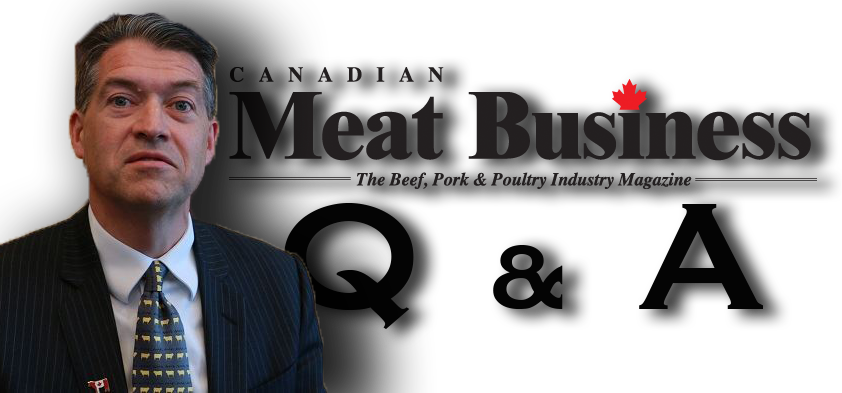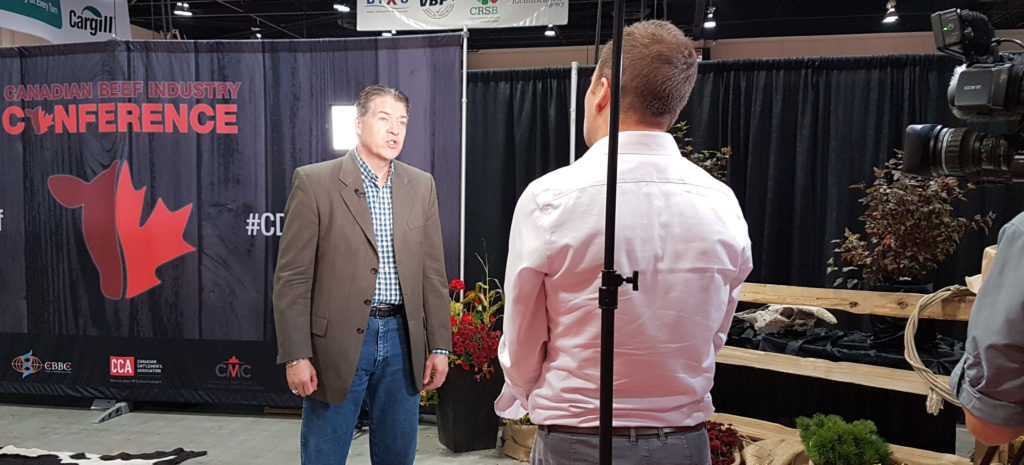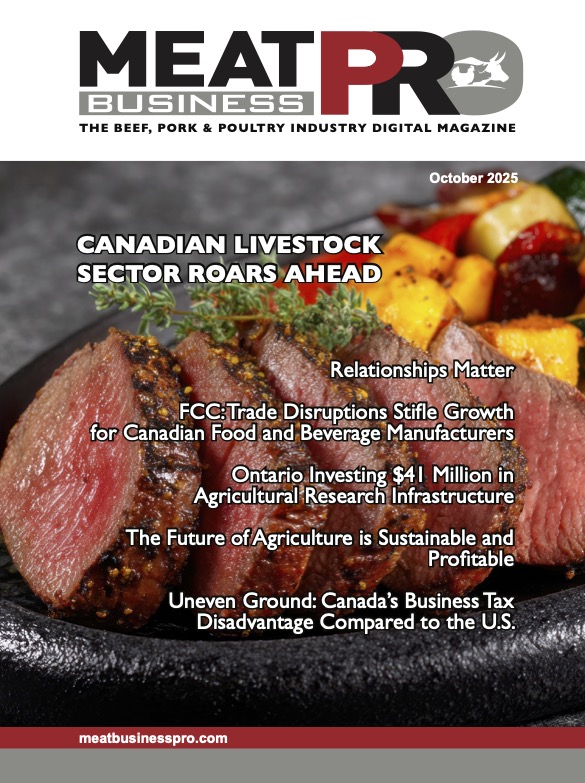John Masswohl Q&A: The Real State of the Trade Talks

The tone of NAFTA headlines throughout the media seems to be particularly negative since the last round of sessions in Ottawa concluded last week. And one word seemed to be used often – stalled
by Cam Patterson
What happened to upset the apple cart at the end of the last session which lit up the headlines?
The U.S. cited a 220% countervailing duty on Bombardier’s C Series commercial jet – direct competition with Boeing – systemically impeding a major sale for the Canadian aircraft manufacturer to Delta Airlines.
“Protectionism does not get more blatant” many were saying, including Foreign Affairs Minister Chrystia Freeland during one of her television interviews. This struck a nerve for many stakeholders with their stock and trade hanging in the balance, especially when you throw in President Trump’s ubiquitous tweeting to terminate NAFTA. Canada jabbed back with Minister Freeland stating Canada would squelch the purchase of the Boeing Super Hornet jet fighters. Some headlines even went so far as to cite this all as tantamount to the beginnings of a trade war – something none of our NAFTA partners – including the U.S. – would benefit from.
Where does that leave our meat industry if the NAFTA talks really do stall?
To more accurately answer that question, Canadian Meat Business spoke to John Masswohl, Canadian Cattlemen’s Association’s (CCA) Director of Government and International Relations. Masswohl served for a time as Agriculture and Trade Counselor with the Canadian Embassy in Washington before joining the CCA. He was front and centre for mCOOL and has seen his fair share of trade negotiations in the past from CETA to TPP and now NAFTA. His take is a little less reactive than what is fueling headlines and he remains steadfastly optimistic when we talked about the state of trade for the Canadian beef industry.
“You have to remember these negotiations are a bit like a puzzle where you start with small pieces, sort things out, and save the hard bits for last and figure out how to make it fit together”
CMB: Let’s begin with your take on the Bombardier/Boeing war playing out against the NAFTA talks.
JM: Well let’s clarify something first that is very important to understand. The U.S Commerce Department implementing a tariff against Bombardier is not connected to the NAFTA negotiations.
CMB: So the headlines citing NAFTA talks have stalled is not accurate?
JM: Not only is it not accurate, quite the opposite is true. The feeling coming out of the last round three was pretty positive overall. They’re making good progress with each side putting their proposals forward with good debate about their merits. You have to remember these negotiations are a bit like a puzzle where you start with small pieces, sort things out, and save the hard bits for last and figure out how to make it fit together. So, they are now getting to the point where it is taking shape, but they know the more difficult chapters are still to be dealt with. But by no way does that mean stalled.
CMB: How many rounds are they planning?
JM: They were planning to stage seven rounds before the end of the year. They’re even talking about accelerating them – shortening the time between rounds, compressing the duration, because the latter rounds, when you get into the tricky negotiations, require more time to debate and make sure all parties are satisfied. They are even completing some chapters between rounds.
CMB: Do you feel the U.S. Commerce Department’s action is not going to impact as much as what’s being insinuated?
JM: Not if you understand it, no I don’t. Granted, it’s a process with a lot of rhetoric and indignation about who is doing what to whom; political wrangling back and forth, that type of thing. But you have to remember, headlines aside, the work on NAFTA modernization is being done by professional negotiators and bureaucrats who are fufilling the job they’ve been tasked with; which is to get a deal. Now, I would say the recent tariff announcement against Bombardier highlights the importance of retaining Chapter 19 – the dispute settlement mechanism – but beyond that, it’s too early to predict or comment on how exactly this process with Bombardier and Boeing is going to play out.
CMB: What do you mean exactly?
JM: The normal process is complaint driven and usually stems from one company that wants to eliminate its competitor from its market. For example, let’s say Company A complains against Company C, and the first thing the U.S. Commerce Department does is do a preliminary determination to see if Company A was harmed by Company C. The answer to that is almost always yes because if the answer is no the whole investigation stops. So, then it proceeds to the actual investigation. The next step is a quick and dirty calculation of what they deduce the amount of subsidy to be and announce a preliminary assessment of duties; hence the 220% levied last week. That amount is almost always high. Now, remember it’s a provisional application, where if the amount has to be paid, then the assessed company will put up a bond – usually – pending the 3rd step. That commences a full investigation and comprehensive review of the 1st step. Typically, this is where Company C gets off the hook. So, if the determination is that there may have been subsidizing of Company C, but if no detriment to Company A resulted, then the whole thing stops, any duties collected are reimbursed. Now, this process takes a few months and the problem is the business uncertainty that transpires during this period tends to impede trade. That would be how this may be perceived to affect the NAFTA negotiations, when in fact, it does not.
John Masswohl giving an interview during the 2017 Canadian Beef Conference
CMB: Then your take so far – with Trump’s tweets notwithstanding – is NAFTA modernization is going forward?
JM: Yes. There’s all the political rhetoric going on in the Twitter sphere and then there’s the reality of what is going on at the negotiating table. The reality is you’ve got professional bureaucrats who are experts at the technical minutia – I used to be one of them and we’re very proud of referring to ourselves as technical nerds – reviewing the text text that has made up the existing agreement for the last 20 some years. Add to that the fact that all negotiators must be satisfied that they fully comprehend any updated provisions so that no unintended consequences result. Moving a comma, or changing an or to and could have major implications on whether you can ship your product or not. Once all three sides are satisfied then they close that particular area of the Agreement and move on. This is slow, painstaking work, and these professionals – from all three party countries – methodically churn through it. These are not the sexy aspects to trade negotiations but it is import to the sectors that trade with the free trade agreement.
CMB: Overall, you’ve been feeling good about the progress so far?
JM: Well, overall what we’ve been hearing from people in the room is that they’re optimistic. Of course, you always want to make sure that what you’ve signed off on improves the current chapter, or ensure it does not backtrack on a commitment. But we should remain mindful that they haven’t gotten to the tough stuff yet.
CMB: Including for the beef industry?
JM: I don’t feel that we have a lot of tough stuff for the beef sector. A lot of what we’re proposing are good regulatory practices.
CMB: Can you give some examples?
JM: We are fundamentally looking at how the border currently operates because we believe we can make the border more efficient. We should be doing away with paper work regardless if it’s livestock, frozen beef, or any perishable products for that matter, because any hour stuck at the border is problematic. We should have it written into a modernized NAFTA that any theoretical paperwork doesn’t exist, because all documents and certifications should be electronically transmitted, preferably before trucks even depart their point of origin, especially in this day and age of advanced real-time data communication that can qualify a pre-approved shipment without physically stopping the truck.
CMB: That certainly falls under the CCA’s points to establish the “Trusted Trading Partner Program”?
JM: Exactly. You’re never going to have a perfect border system, and once we’ve designed approval components to certify a producer as a trusted trading partner, we’d have to sort out the logistics that need to be streamlined. That’s what we really need to figure out how to improve on, because the bottom line is, you don’t want that truck load of cattle stuck in an inspection queue of 40 trucks. And this is more than a commerce and trade value priority, but an animal welfare concern that would have a trilateral trading benefit.
CMB: Are there any points the CCA has made regarding NAFTA that you’d like to see make into a modernized deal?
JM: One of the points we have been suggesting that would fit into that difficult category later in the negotiations is the huge market, with respect to U.S. Government Procurement, that we have no access to such as U.S. Military food buying for personnel, U.S. federally funded school lunch programs, etc. They have Buy America requirements attached to them. If we are seeking an agreement that results in better economic activity going both ways, that is something we’d like to see in a re-drafted NAFTA.
CMB: Would you say the negotiations could be completed by the end of the year?
JM: U.S. Trade Minister Robert Lighthizer was asked a similar question actually – and he’s a lawyer – but his answer was, “If you’re asking me if I still believe it can be done by the end of the year, that implies that I did at one point believe it to be true, so I’m not going to comment on that.” Seems to say it all I think.
CMB: So, you’re saying “No Comment”?
JM: Here’s what I’ve always said on the timetable. You can do it quick or you can do something meaningful. There’s a difference between modernizing and re-negotiating. In my mind modernization means we have to table items all three countries can agree on, items that either didn’t exist when we first negotiated the deal or the technology has evolved and we can do things differently since the deal’s inception. That is modernizing. Re-negotiating is more difficult in that key points each partner didn’t get the last time around are now proposed for inclusion into NAFTA – like government procurement for example. Keep in mind that for the most part, re-negotiating is usually the points that were too hard to agree on before, and subsequently will not be any easier now. We’re talking about trade requirements that one country or the other is either sensitive to or protective over and doesn’t want to give access to, or is looking to garner better market access that they have not had to date. So, basically, I’m saying that if this was just about modernizing, it could be done pretty quickly. But if it’s about getting into politically sensitive areas, well that is something quite different. That involves everyone having to compromise or be willing to feel some trading pain. Regardless, I don’t see that happening on an accelerated timetable.
CMB: Can we talk about TPP 11? Do you think we could see that revive to a possibly ratified deal?
JM: You know that is one trade agreement where I’ve seen a lot of work below the surface, trying to figure out how to salvage this agreement. Over the last months, since March, meetings between senior officials have been conducted to scope out reviving the deal without U.S. inclusion. And I am optimistic. I think they can do it.
CMB: Do you think access to Japan is still obtainable, given the tariff limitations now?
JM: Well, it was a big concern for us when Japan put their temporary safeguard tariff in place this summer, increasing the tariff on beef from 38.5% to 50% against all countries that currently don’t have a free trade agreement with them. The irony is it was the surge of imports from Australia that triggered the safeguards, but the reality is Australia only pays half that since they do have an agreement in place with Japan. So, we made the argument that if they want to achieve the objective to protect their market from the surge of product, then they should exempt Canada from it. But I’m pretty sure this was a message from Japan; if you want to be exempt from these tariff safeguards, you should do a free trade deal with Japan and implement the TPP.
CMB: So you think Japan acted to revive the TPP?
JM: Yes, I think so. I don’t think it was a message that was aimed solely at Canada, but rather the United States. But that said, I am optimistic that wheels are turning. The analysis shows you the TPP is more beneficial to Canada and Mexico without the U.S. We retain our NAFTA benefits without diluting our access to the United States, while at the same time securing access to Japan without U.S dissolution. However, for countries like Malaysia, Vietnam, and many of the other partners, their goal was the access into the U.S. market. So, naturally, without U.S. inclusion that would mean a leap of faith would have to be taken by those countries. If they go ahead with the TPP, they’ve got to be strategically thinking the U.S. would opt back in – the other side of that is once it would move forward, it would generate an impetus for the U.S. to opt back in. If I was negotiating for one of those countries, I’d be asking what provisions are currently in the agreement because the Americans wanted them, and then suspend them until such a time the American’s re-join and reinstate those provisions. This scenario could provide leverage not previously held by those countries.
CMB: What is on the horizon for yourself and the CCA with respect to plans to better the beef trade?
JM: As you know, we’ve been pressing for equitable access into China to reacquire the same opportunities on par with the U.S. after they leap frogged this past summer. We will be traveling with Agriculture Minister Lawrence MacAulay this November so we are keeping our fingers crossed we can regain that trade. And of course, our attention remains fixed on NAFTA. We will be in Washington for the next session.
CMB would like to thank Canadian Cattlemen’s Association’s (CCA) Communication Manager, Gina Teel, for her help facilitating this Q&A












